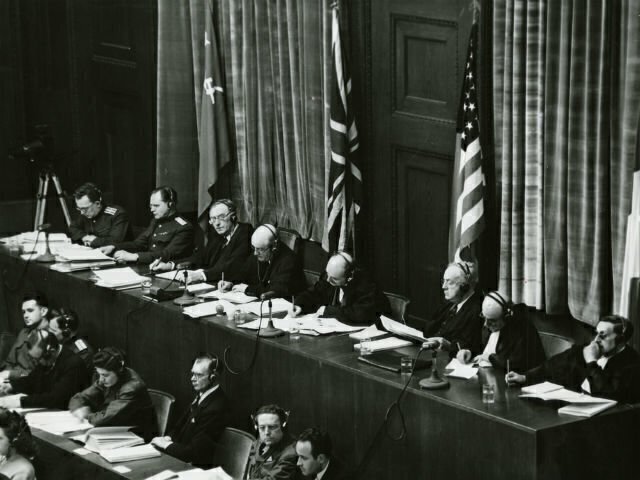
Last month marked the 70th anniversary of the end of the Nuremberg trials. The tribunal, which consisted of judges from the United States, the Soviet Union, France and Great Britain, was created to try prominent members of the Nazi Party for war crimes after the conclusion of World War II.
During the trials, which began in November 1945 and concluded in October 1946, 24 German officials and party members were tried, including Hermann Goering and Martin Bormann. Of the 24 officials indicted at Nuremberg, 12 were sentenced to death; seven were sentenced to imprisonment spanning from 10 years to life; three were acquitted; and two trials never proceeded.
After World War II, the most feasible options for the Allies were to release the Nazi officials, an almost unthinkable act which would have essentially affirmed that no crimes took place; to hold the Nazi leadership accountable outside through extra-judicial means; or to create a tribunal and hold trials.
The atrocities committed by the Nazis during the war were unprecedented. For that reason, international law had not addressed a course of action for punishing war crimes on such a grand scale. Britain’s Foreign Secretary, Anthony Eden, claimed that the “guilt” of the accused war criminals was “so black that they fell outside … any judicial process.” Indeed, the suggested method of justice for Axis leaders by top British officials, including Winston Churchill, was death by firing squad without trial. However, both the Soviet Union and the United States insisted on some sort of war tribunal to legitimize the punishments. Whether this insistence was for political reasons or moral reasons—or a mix of the two—is a matter of debate.
The trials have been called one of the greatest feats of international law until that time. The scale and scope of the trials was immense. While many believe that the Nuremberg trials were responsible for delivering justice to the most evil force the Earth had ever seen, some have taken a more critical stance on the trials and the precedents they established.
During his trial, Hermann Goering wrote in the margins of his indictment, “The victor will always be the judge and the vanquished the accused.” While acknowledging the horrific atrocities carried out by Goering and other Nazi officials, some historians have had similar qualms, even going so far as to call the trials “Victor’s Justice.”
Criticism stems from what could be called a “retroactive” creation of international law. Because of the unprecedented nature of the Holocaust and the Nazi regime, international law as it existed at the time did not suffice to prosecute those indicted, “so the Allies fudged a new law and applied it ex post facto.” Those laws prohibited what became known as “crimes against humanity.” At the time, some legal experts believed that if the trials were to be considered legitimate, law must be applied as it was written when the crimes took place. Even the Chief Justice of the Supreme Court at the time, Harlan Fiske Stone, claimed that the trials were a “lynching party.”
Despite these criticisms, the Nuremberg trials were momentous, for a number of reasons. They are remembered by many as an important development in how justice is carried out for war crimes on both the international and state levels. The trials acknowledged that the crimes committed by the Nazis were not done by some intangible entity; they were committed by men. Even further, the trials held those men accountable for their actions. By establishing that individuals were responsible for the crimes of a state, the Allied Powers hoped to prevent such crimes from occurring again in the future. As Nuremberg prosecutor Whitney Harris explained, “For the first time in history, absolute rulers were brought to account before the law. There is no longer any state, or any ruler of any state, who can claim total immunity from the law. … The age of empires has passed. At Nuremberg we put tyranny on trial.”
In addition, much of the information that we now know about the Holocaust was disclosed during the trials, including reports regarding the more than six million people systematically killed by the Nazis. Robert Jackson, chief U.S. prosecutor and future Supreme Court Justice, declared, “Unless record was made … future generations would not believe how horrible the truth was.”
Perhaps the greatest contribution of the Nuremberg trials was to elevate the rule of law and procedural justice above the urge for retribution and retaliation—even in one of humanity’s darkest moments. As Justice Jackson stated, the existence of the Nuremberg trials was "one of the most significant tributes that Power has ever paid to Reason." This commitment to law and international cooperation defined a principal difference between the Allied Powers and the Axis Powers.
To this day, the trials have influenced how war crimes are tried, not just internationally but also within the jurisdiction of the United States. For example, under the Alien Tort Statute, foreign citizens are able to be convicted or seek justice for human rights violations within the U.S. court system. Indeed, within the last 10 years, numerous “federal district courts have relied on the Nuremberg trials in finding that corporations can be found liable for aiding and abetting human rights violations abroad.” The Obama administration has also used the Nuremberg trials as support for closing the military prison at Guantánamo Bay.
Seventy years after the final verdicts at Nuremberg, it is clear that it was one of the most important legal moments in modern history, if not the “greatest trial in history.”
Maggie Baldridge is an intern at the National Constitution Center. She is also a recent graduate of Dickinson College.







